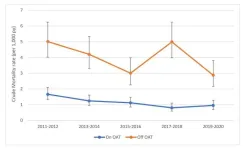(Press-News.org) Women are more likely to receive good care during pregnancy where AI and other clinical software tools are used, a large review of research has found.
In a paper published in eClinicalMedicine researchers have conducted a review of over 12,000 papers and 87 articles for different AI and related software tools, investigating the impact of their use in maternity settings. A meta-analysis of 35 included studies found the odds of improved outcomes was 1.69 times higher in women cared for using CDSS, with data from over 5.2 million pregnancies in both High-Income and Low-and-Middle-Income Countries.
“The government has made digital transformation of the NHS a top priority to improve quality of care and reduce costs, and Clinical Decision Support Systems will be a key technology in delivering these improvements.
“However, there needs to be systematic, rigorous, and rapid evaluation of the tools being used in order to ensure they are doing what is expected while keeping up with the pace of change in technology.”
Neil Cockburn, Health Informatics Research Fellow, Department of Applied Health Sciences
In a bid to encourage safer maternity services, academics from the University of Birmingham, Birmingham Health Partners, Keele University, Warwick University and the Shrewsbury and Telford Hospitals NHS Trust evaluated almost 50 different types of CDSS across 49 High-Income and 38 Low-and-Middle-Income Countries.
The findings revealed that although there were variations in each situation and implementation of CDSS that they reviewed, most showed improvements in outcomes for the pregnancies.
Neil Cockburn, lead author and Research Fellow in Health Informatics at the University of Birmingham said: "Maternity services are under huge pressure in the UK and internationally, and that makes it challenging to offer safe services. We can see this in the huge rise in hospitals receiving support from the Maternity Safety Support Programme.”
“One solution is the use of AI and related software tools called ‘Clinical Decision Support Systems’ to help expecting families and healthcare workers to make safe decisions, so we looked at every evaluation of these kinds of software ever published in academic literature."
In a study led by the Bristol University that was reviewed, a software program trialled was designed to help women decide if they wanted a vaginal birth after previously having a c-section. This CDSS supported women in feeling more confident about their decisions by providing them with useful information about risks and benefits, while reducing the rate of c-section overall.
Another study supported by the Tommy's National Centre for Miscarriage Research trialled a risk-prediction model to accurately triage women as at low risk of having an ectopic pregnancy, which can be life-threatening in some cases. These examples highlighted the possibility for CDSS to support both clinical and individual decision-making concerning maternity care; an important step for supporting safe pregnancies in the future.
The team note that while substantial contributions can be made to maternity care with CDSS, it relies on appropriateness to each unique situation. As the first systematic review of CDSS, it is hoped that this will encourage evaluations of different CDSS to continue aiding clinicians, developers, and researchers in maternity care.
END
AI-related maternal healthcare software improves odds of good care by 69%, research finds
Using Clinical Design Support Systems (CDSS) can help to make maternity services safer for pregnant women
2024-10-23
ELSE PRESS RELEASES FROM THIS DATE:
British Sleep Society advocates for permanent Standard Time in the UK
2024-10-23
The British Sleep Society has released a position statement in the Journal of Sleep Research advocating for the abolition of the twice-yearly clock changes in the UK and the restoration of permanent Standard Time (Greenwich Mean Time). This recommendation is based on scientific evidence highlighting the adverse effects of the clock change and Daylight Saving Time (DST) on sleep and circadian health.
The British Sleep Society emphasizes that sleep is central to health and well-being and the enforced changes of clock time to DST can interfere negatively with sleep regulation. “What we often don’t realize is that DST changes our schedules, moving them ...
Can mobile phone networks and Bluetooth technology help researchers improve animal tracking?
2024-10-23
Animal tracking studies for ecology and conservation all face technological limitations such as high costs or the need for tags to remain in close proximity to detectors. In research published in Methods in Ecology and Evolution, investigators describe a solution that can overcome many current limitations by employing the massive global network of personal mobile phones as gateways for tracking animals using Bluetooth low energy beacons.
In areas with medium to high density of people, these simple, lightweight, and inexpensive beacons can provide regular updates of position with a battery life of 1–3 years. Through field testing ...
Does the availability of parental leave affect social norms on gender division of childcare?
2024-10-23
In research published in the British Journal of Social Psychology, investigators examined the relationship between countries’ parental leave policies and young adults’ perceptions of social norms for the division of childcare duties between mothers and fathers.
In the study of 19,259 university students (11,924 women) from 48 countries, the degree to which participants believed childcare is equally divided among mothers and fathers and the degree to which they believed childcare should be equally divided were both stronger when parental leave was available in their particular country.
Analyses of time since policy change suggested ...
Can reducing moose numbers help protect Canadian caribou populations from wolf predation?
2024-10-23
Woodland caribou populations in Canada are declining because of habitat changes that benefit common prey species of wolves (such as moose and deer), leading to increasing numbers of wolves that kill caribou. To protect caribou, wildlife managers have reduced wolf numbers in some caribou ranges, but this may cause moose populations to grow, resulting in a wolf rebound. New research in The Journal of Wildlife Management has found that reducing moose populations to historical levels through hunting could be helpful for caribou conservation.
The analysis included regions in British Columbia and Alberta with high moose populations where lethal wolf removals were annually conducted ...
How limiting new fast-food outlets may reduce childhood obesity
2024-10-23
Planning policies to restrict the number of new fast-food outlets leads to fewer overweight and obese children according to research led by Lancaster University.
Researchers examined the impact of policy in the North East of England where Gateshead Council prevented any existing non-fast-food commercial property from being converted into a hot fast-food takeaway.
The lead authors of the study, published in the journal Obesity, are Dr Huasheng Xiang from Lancaster University Management School and Professor of Health Inequalities Heather Brown from the Faculty of Health and Medicine at Lancaster University.
The researchers used Government collected data that ...
Sleep experts call for UK to abolish twice-yearly clock changes
2024-10-23
A team of leading sleep researchers from the British Sleep Society have called for the government to abolish the twice-yearly clock changes in the UK due to the adverse effects on sleep and circadian health.
After considering the available scientific evidence that circadian and sleep health are positively affected by the availability of natural daylight during the morning and negatively affected by the twice-yearly changes of clock time, especially when the clocks move forward in spring, the British Sleep Society recommends the abolition of the twice-yearly clock changes in the UK.
With sleep being central to health and wellbeing, the Society has issued a statement ...
Risk of cardiovascular disease linked to long-term exposure to arsenic in community water supplies
2024-10-23
Long term exposure to arsenic in water may increase cardiovascular disease and especially heart disease risk even at exposure levels below the federal regulatory limit (10µg/L) according to a new study at Columbia University Mailman School of Public Health. This is the first study to describe exposure-response relationships at concentrations below the current regulatory limit and substantiates that prolonged exposure to arsenic in water contributes to the development of ischemic heart disease.
The researchers ...
Taking the “vibrational fingerprints” of molecules got 100 times faster
2024-10-23
Researchers Takuma Nakamura, Kazuki Hashimoto, and Takuro Ideguchi of the Institute for Photon Science and Technology at the University of Tokyo have increased by a 100-fold the measurement rate of Raman spectroscopy, a common technique for measuring the “vibrational fingerprint” of molecules in order to identify them. As the measurement rate has been a major limiting factor, this improvement contributes to advancements in many fields that rely on identifying molecules and cells, such as biomedical diagnostics and material analytics. The findings were published in the journal Ultrafast ...
Gardens prevent pollinators from starving when farmland nectar is scarce, new study finds
2024-10-23
Gardens offer a steady and reliable source of nectar all year round, helping to keep pollinators fed when farmland sources are limited, researchers have discovered.
This consistency means that even small patches of gardens in rural areas can sustain pollinators, particularly in early spring and late summer when nectar is scarce.
In the findings, published today in Proceedings of the Royal Society B, scientists at the University of Bristol discovered that gardens can provide between 50% and 95% of the total nectar during these critical ...
Addiction treatment decreases suicide risk among people with opioid dependence
2024-10-23
Treating opioid use disorder significantly lowers the very high rate (8 times the general population) of suicide among people with opioid dependence.
A Scottish study led by Glasgow Caledonian University of over 45,000 patients receiving methadone or buprenorphine for opioid use disorder reported this important result today in the scientific journal Addiction.
There were 575 suicides among the group of 46,453 people with opioid use disorder, accounting for 1.2% of the group. Although every member of the group received an OAT prescription at some point between 2011 and 2020, some ...
LAST 30 PRESS RELEASES:
ASU researchers showcase scalable tech solutions for older adults living alone with cognitive decline at AAAS 2026
Scientists identify smooth regional trends in fruit fly survival strategies
Antipathy toward snakes? Your parents likely talked you into that at an early age
Sylvester Cancer Tip Sheet for Feb. 2026
Online exposure to medical misinformation concentrated among older adults
Telehealth improves access to genetic services for adult survivors of childhood cancers
Outdated mortality benchmarks risk missing early signs of famine and delay recognizing mass starvation
Newly discovered bacterium converts carbon dioxide into chemicals using electricity
Flipping and reversing mini-proteins could improve disease treatment
Scientists reveal major hidden source of atmospheric nitrogen pollution in fragile lake basin
Biochar emerges as a powerful tool for soil carbon neutrality and climate mitigation
Tiny cell messengers show big promise for safer protein and gene delivery
AMS releases statement regarding the decision to rescind EPA’s 2009 Endangerment Finding
Parents’ alcohol and drug use influences their children’s consumption, research shows
Modular assembly of chiral nitrogen-bridged rings achieved by palladium-catalyzed diastereoselective and enantioselective cascade cyclization reactions
Promoting civic engagement
AMS Science Preview: Hurricane slowdown, school snow days
Deforestation in the Amazon raises the surface temperature by 3 °C during the dry season
Model more accurately maps the impact of frost on corn crops
How did humans develop sharp vision? Lab-grown retinas show likely answer
Sour grapes? Taste, experience of sour foods depends on individual consumer
At AAAS, professor Krystal Tsosie argues the future of science must be Indigenous-led
From the lab to the living room: Decoding Parkinson’s patients movements in the real world
Research advances in porous materials, as highlighted in the 2025 Nobel Prize in Chemistry
Sally C. Morton, executive vice president of ASU Knowledge Enterprise, presents a bold and practical framework for moving research from discovery to real-world impact
Biochemical parameters in patients with diabetic nephropathy versus individuals with diabetes alone, non-diabetic nephropathy, and healthy controls
Muscular strength and mortality in women ages 63 to 99
Adolescent and young adult requests for medication abortion through online telemedicine
Researchers want a better whiff of plant-based proteins
Pioneering a new generation of lithium battery cathode materials
[Press-News.org] AI-related maternal healthcare software improves odds of good care by 69%, research findsUsing Clinical Design Support Systems (CDSS) can help to make maternity services safer for pregnant women



